The Economics and Statistics Division maintains archives of previous publications for accountability purposes, but makes no updates to keep these documents current with the latest data revisions from Statistics Canada. As a result, information in older documents may not be accurate. Please exercise caution when referring to older documents. For the latest information and historical data, please contact the individual listed to the right.
<--- Return to Archive
For additional information relating to this article, please contact:
April 28, 2021BANK OF JAPAN MONETARY POLICY Based on the current economic situation and the economic outlook, the Bank of Japan decided to maintain the negative interest rate of -0.1% on balances of financial institutions at the Bank. The Bank of Japan will also purchase a necessary amount of Japanese government bonds (JGBs) without setting an upper limit in order to keep the 10-year JGB yields at around zero per cent.
In addition, the Bank will actively purchase exchange-traded funds (ETFs) and Japan real estate investment trusts (J-REITs) so that their amounts outstanding will increase at annual paces with upper limit of about 12 trillion yen and about 180 billion yen, respectively. The Bank will continue purchases of Commercial paper and corporate bonds with an upper limit on the amount of outstanding of about 20 trillion yen in total until the end of September 2021.
The Bank will continue with "Quantitative and Qualitative Monetary Easing (QQE) with Yield Curve Control," aiming to achieve the price stability target of 2 per cent, as long as it is necessary for maintaining that target in a stable manner. The Bank also noted that it will continue expanding the monetary base until the year-on-year rate of increase in the observed CPI (all items less fresh food) exceeds 2 per cent and stays above the target in a stable manner.
In response to COVID-19, the Bank will continue to support financing of firms and maintain financial market stability through:
- the Special Program to Support Corporate Financing,
- provision of yen and foreign currency funds without setting upper limits, and
- active purchases of ETFs and J-REITs.
Japan's economic activity, particularly in the face-to-face service sector, is expected to be lower than prior to the pandemic for time being, but will gradually recover with support from increase in external demand, accommodative financial conditions, and government economic measures. Recovering economies have lifted exports and industrial production and business sentiment has improved. Employment and income situation remains weak. Compared to previous projections, the outlook for real GDP is stronger but still uncertain and depends on developments around the pandemic. The median projection for real GDP for each fiscal year is for -4.9% in 2020, +4.0% in 2021, +2.4% in 2022 and +1.3% in 2023.
The Japan consumer price index (CPI, all items less fresh food) is expected to be slightly negative in the short-term due to COVID-19 and rebasing effects. Excluding temporary effects, year-on-year CPI change is expected to be steady before rising with energy prices later in the year. The Bank of Japan notes that the "...medium- to long-term inflation expectations are likely to be more or less unchanged". The median BoJ inflation projection for the fiscal years are -0.4% in 2020, +0.1% in 2021, +0.8% in 2022, and +1.0% in 2023.
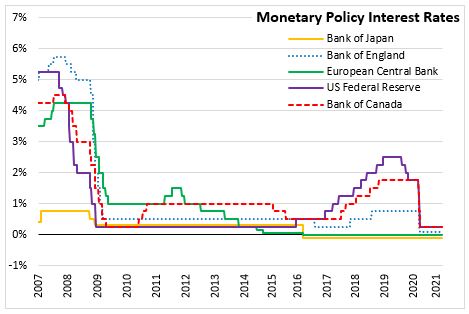
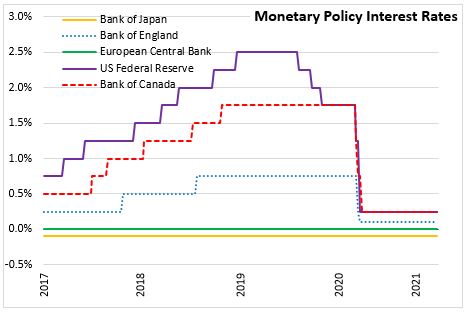

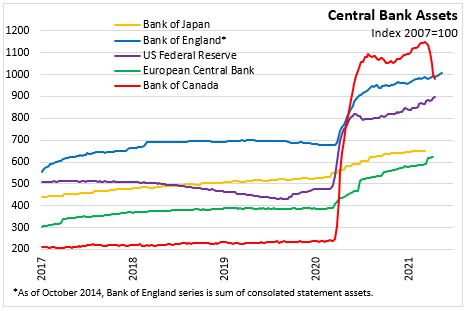
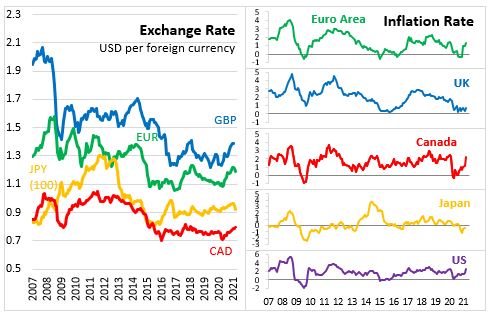
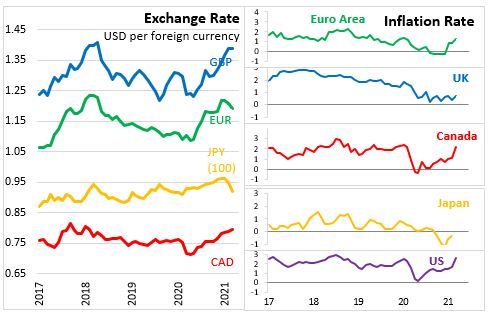
Source: Bank of Japan, Outlook for Economic Activity and Prices
<--- Return to Archive